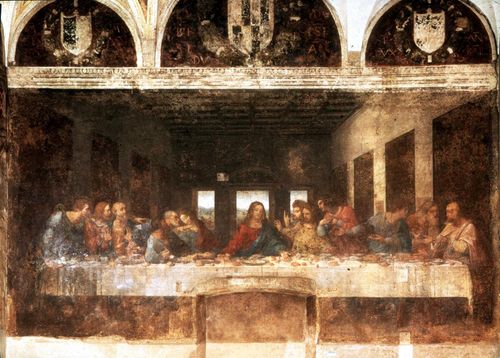2 Kings 21:1-5
Manasseh was twelve years old when he began to reign, and he reigned fifty-five years in Jerusalem. His mother's name was Hephzibah. And he did what was evil in the sight of the LORD, according to the despicable practices of the nations whom the LORD drove out before the people of Israel. For he rebuilt the high places that Hezekiah his father had destroyed, and he erected altars for Baal and made an Asherah, as Ahab king of Israel had done, and worshiped all the host of heaven and served them. And he built altars in the house of the LORD, of which the LORD had said, “In Jerusalem will I put my name.” And he built altars for all the host of heaven in the two courts of the house of the LORD.
1 Corinthians 11:23-26
For I received from the Lord what I also delivered to you, that the Lord Jesus on the night when he was betrayed took bread, and when he had given thanks, he broke it, and said, “This is my body which is for you. Do this in remembrance of me.” In the same way also he took the cup, after supper, saying, “This cup is the new covenant in my blood. Do this, as often as you drink it, in remembrance of me.” For as often as you eat this bread and drink the cup, you proclaim the Lord's death until he comes.
———————
The first time “Manasseh” appears in the Bible; it is a name bequeathed to the firstborn son of Joseph in Egypt. In Genesis 41:51, it says, “Joseph called the name of [his] firstborn Manasseh. ‘For,’ he said, ‘God has made me forget all my hardship and all my father's house.’”
If you have read the account of King Manasseh in 2 Kings 21, you realize the meaning of this name must connote something far different with this king. Peter Leithart unpacks the meaning of the name with this exceptionally bad king: “He is appropriately named not because he caused Israel to forget its troubles, but because he forgot the Lord, his deliverance of Israel from Egypt, and his commandments. Each time the Bible says that Judah is condemned to exile ‘because of Manasseh,’ the original readers [in Babylonian Exile] would have recognized that they are condemned because of forgetfulness: forgetfulness seduced them to do evile; because of forgetfulness the land became full of innocent blood; and even after Josiah the Lord did not turn from his wrath ‘because of all the provocations with which forgetfulness had provoked him.’” (Brazos Theological Commentary: 1&2 Kings, Brazos, 2006, p.261)
Leithart then discerns an incredible theological insight that’ll preach: Humans are called to memory— remembering God’s goodness, ways, expectations, and provoking gratitude for salvation. The Irony of ironies is that we want (need) God to be forgetful! We do not want Him to remember our sins. And this is what we get: Isaiah 43:25 God proclaims “I, I am he who blots out your transgressions for my own sake, and I will not remember your sins.” And the coup de grâce of all sin forgetting, Psalm 103:12 – “As far as the east is from the west, so far does he remove our transgressions from us.” That’s a good kind of forgetfulness!
This object lesson from King Manasseh’s forgetfulness is a reminder of why followers of the Lord Jesus need the sacrament of Communion. The Words of Institution drive it home: Paul begins, “For I received from the Lord what I also delivered to you…” A treasure received, a treasure delivered— faithfully and intact. We partake, among other things, so that we will not be “Manasseh.”
The Sacrament is central in our worship ritual, and physically, the Table itself is always located front and center in the sanctuary. When you think about it, in worship, we hear the Word proclaimed, and our eyes see the Table. The experience is an ongoing liturgical habit of sight, sound, and taste to preclude forgetfulness. “Do this in remembrance of me.” “Do this, …often” …for when you do “you proclaim the Lord's death until he comes.” Perhaps this is why the Roman Catholic Church makes the Mass the high point of their worship service. From their perspective, there is no worship apart from the Table.
Let us not be forgetful.


